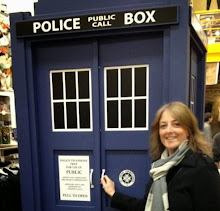Tuesday, June 5, 2007
Biometrics and DNA-enabled passports
 About 10 years ago, a large brown envelope arrived in my mailbox from my old alma mater. It contained a request for me to participate in a long-term research study that the university was undertaking on the effects of drinking water from Lake Ontario, which I had been drinking for most of my life. The large brown envelope also contained a much tinier brown envelope into which I was to deposit the clippings of all ten of my toenails. Once I got past the "ew…gross" factor, I began to ponder the implications of sending away little pieces of my DNA that were to go on file for a decades-long study. Despite the assurances from this well-respected university that my toenail clippings would be kept secure and not used for any other purpose, I opted not to participate, as I just did not feel comfortable with the prospect.
About 10 years ago, a large brown envelope arrived in my mailbox from my old alma mater. It contained a request for me to participate in a long-term research study that the university was undertaking on the effects of drinking water from Lake Ontario, which I had been drinking for most of my life. The large brown envelope also contained a much tinier brown envelope into which I was to deposit the clippings of all ten of my toenails. Once I got past the "ew…gross" factor, I began to ponder the implications of sending away little pieces of my DNA that were to go on file for a decades-long study. Despite the assurances from this well-respected university that my toenail clippings would be kept secure and not used for any other purpose, I opted not to participate, as I just did not feel comfortable with the prospect.Fast-forward a decade and it appears that our governments will eventually be forcing us to provide DNA samples, if we ever want to travel outside the country, that is. According to a CanWest News report:
Canadians will inevitably have to carry travel documents with their DNA,
biometrics or other biological identifiers in order to ensure secure border
travel to the United States, according to a new white paper to be revealed to
government officials in Ottawa Monday.
Although some technology, such as DNA-enabled passports or driver's
licences, may be a long way off, terror threats and other looming risks mean
governments must begin to seriously consider how they will introduce those
measures in the future, [said Michael Hawes, executive director of the
Foundation for Educational Exchange between Canada and the United States of
America.]
The white paper will outline the implications of the U.S.’s Western Hemisphere Travel Initiative, which earlier this year required Canadians flying into the U.S. to carry a passport and which will require all Canadians driving or walking across the border to have a passport by 2008.
A few toenail clippings in a university researcher’s file cabinet are a minor concern compared to a DNA profile being available in electronic format to my own government, let alone a foreign government. While the purpose is to guarantee that I am who I say I am when traveling in and out of my country, what would happen if the electronic representation of my DNA were stolen? Just ask someone who shares a similar name to someone on the U.S. "no-fly" list how easy it is to prove who they are: how much more difficult and dangerous will it be if your DNA profile is stolen or altered?
It raises the question of ownership of the data and informed consent to citizens about how it will be used. Citizens should have assurances that their DNA profile will not be collected or saved by foreign governments and that the information will not be made available to other government agencies or third parties. Genetic information from DNA and other biometric information can be dangerous not only if it is used to assume someone’s identity, but also if it reveals health or social information that could be used in a negative way against the owner.
The use of biometrics and DNA seems inevitable in an increasingly security-obsessed world. As citizens we need to pay very close attention to these initiatives and the laws in place to protect our identity.
Posted by Sharon E. Herbert at Tuesday, June 05, 2007
Labels: Biometrics, Border, Canada, Department of Homeland Security, DNA, Identification, Identity, Passports, SBInet, Secure Border Initiative, United States, Western Hemisphere Travel Initiative
Subscribe to:
Post Comments (Atom)





1 comment:
Hi Sharon,
I picked a little older post, since I was going to be off topic, but I just wanted to let you know that I don't think your "add this" button is working. I subscribed, and when it finally made it to Google Reased, the title was "" (only quotes).
Terrific looking blog with some really great posts! You can tell I liked it, since I subscribed.
Keep up the good work.
Post a Comment